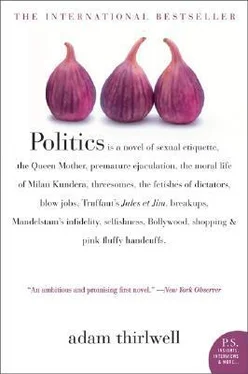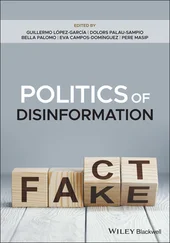Adam Thirlwell - Politics
Здесь есть возможность читать онлайн «Adam Thirlwell - Politics» весь текст электронной книги совершенно бесплатно (целиком полную версию без сокращений). В некоторых случаях можно слушать аудио, скачать через торрент в формате fb2 и присутствует краткое содержание. Год выпуска: 2004, Издательство: Harper Perennial, Жанр: Современная проза, на английском языке. Описание произведения, (предисловие) а так же отзывы посетителей доступны на портале библиотеки ЛибКат.
- Название:Politics
- Автор:
- Издательство:Harper Perennial
- Жанр:
- Год:2004
- ISBN:нет данных
- Рейтинг книги:3 / 5. Голосов: 1
-
Избранное:Добавить в избранное
- Отзывы:
-
Ваша оценка:
- 60
- 1
- 2
- 3
- 4
- 5
Politics: краткое содержание, описание и аннотация
Предлагаем к чтению аннотацию, описание, краткое содержание или предисловие (зависит от того, что написал сам автор книги «Politics»). Если вы не нашли необходимую информацию о книге — напишите в комментариях, мы постараемся отыскать её.
Moshe loves Nana. But love can be difficult — especially if you want to be kind. And Moshe and Nana want to be kind to someone else.
They want to be kind to their best friend, Anjali.
Politics
Politics — читать онлайн бесплатно полную книгу (весь текст) целиком
Ниже представлен текст книги, разбитый по страницам. Система сохранения места последней прочитанной страницы, позволяет с удобством читать онлайн бесплатно книгу «Politics», без необходимости каждый раз заново искать на чём Вы остановились. Поставьте закладку, и сможете в любой момент перейти на страницу, на которой закончили чтение.
Интервал:
Закладка:
Moshe looked at Elizabeth Windsor, fondly. Indulgently, he observed the ragged points of her scuffed and skyblue shoes. Time was running out , he thought. He guessed at the enticements beneath her artfully draped chiffon. Her legs, he admitted, were odd. Her shins were thick with ulcers. They looked like plastic. She had the legs of an unusual Barbie doll. And her arms were cracked and bruised.
Moshe suddenly imagined the Queen Mother cooking heroin on a heavy silver spoon, while she tugged with her teeth on a silk tourniquet wrapped round her arm. Or perhaps Lady Anne Screeche did the tourniquet — perhaps Lady Anne did everything for her.
None of this seemed very likely.
And I think he was right. I do not think it is believable that the Queen Mother was a nymphomaniac drug addict. But Moshe was right to consider it. It is always important to reimagine the lives of the rich and famous. It is very good practice for kindness. It makes you more empa- thetic.
Oh, thought Moshe. Oh you sweetie.
And then, as if he wasn’t delighted enough, the handwritten thank-you letter. Addressed to the Director of the Barbican, on six octavo sheets of Clarence House notepaper, embossed with a curly entwined ER topped with a crown, she wrote:
It always causes such delight and trepidation when I receive my invitation to the Barbican. Every concert is so perfect. But there is also trepidation and this is because it is always so perfect! Every year, I am so worried for the new performers. I am worried that it will be impossible to enjoy it as much as the year before.
But I did!
Perhaps you do not read Sir Max Beerbohm but he is one of my very favourite writers, and in his book Zuleika Dobson he describes how everyone falls in love with a young girl called Zuleika because she is so beautiful. Now of course it is not quite right to call you all Zuleika, when there are so many of you, and all so talented. But I have to say that every time I hear you play I feel awestruck like one of Zuleika’s admirers.
Perhaps you find this letter too light-hearted for such an occasion but when I left you on Saturday I was feeling utterly exhilarated and I am afraid that I still feel exhilarated.
With my warm thanks I am, ever yours sincerely, Elizabeth R.
What a charmer, Moshe had thought, perusing his personal photocopy. What a doll. And after all, thought Moshe, what’s wrong with politeness? And I agree with him. There is nothing wrong, after all, with virtue.
So that is why poor exhausted impatient Moshe, talking to Papa, yearned for regal politesse.
He knew all about these backstage meetings. He was bored by them. Unless there was a sexy widow, these parties made Moshe feel slightly aggrieved. Not the champagne and caviar canapes, but the people made him aggrieved. The board of directors annoyed him. There you were, grumbled Moshe to himself, and they wanted you to thank them. They wanted you to be intrigued by their insights into acting.
Moshe has his problems, as we all do. So he can be quite crude. Especially when he is tired or scared. Let us leave him be. Let us ignore this grumbling. Let us forgive the fact that he did not see Papa’s personal politesse.
He may not have been regal, but Papa had an etiquette all of his own. There was something soulful about him. And although ‘soulful’ is not a word I like, it is a word that Papa liked. So I will call him soulful. In fact, I will go further. In homage to Papa and his otherworldly instincts, I will give him an image. Papa is the benevolent angel of this story.
There were two reasons for Papa’s chattiness about Prince Kropotkin. This was Papa’s first performance as a board member. So he was looking keen. He was impressing the board with his commitment. And also, he was being kind. Chatting to Moshe about Prince Kropotkin was intended to flatter Moshe. It was not a lecture. It was designed to show that Papa had been entranced by Moshe’s performance. It was a compliment.
While Moshe was being depressed at Papa, Nana had sidled off. Difficult Moshe had made her shy. She felt shy with this man impressing her Papa. Whereas here was a pretty and talkative girl called Anjali who loved the shiny green bead mesh of Nana’s bracelet. Anjali had a plastic diamond in her right ear. Nana said that oh the bracelet was quite uncomfortable. It looked okay but it crushed her wrist. She looked at Anjali, and Anjali smiled at her. Nana took off her small black glasses — rotating them from the right-hand earpiece with two fingers.
Anjali is the other heroine of this story.
Nana specially admired Anjali’s make-up. So I will describe it. High up on her cheekbones, Anjali had pink blusher. She had smoothed it right up to the bottom of her eyes. Round the eye itself, she had smoky black eyeliner. On the eye-socket bone she had stroked on some soft brown eyeshadow, fading to her skin tone.
Nana liked this. Anjali had style.
Nana took a champagne. Then she took one mini blini with red caviar and sour cream. Then another mini blini topped with the mini croissant of a minute prawn. She clamped the precarious champagne between her third and fourth fingers.
She said, ‘Thass a cool name, Anjli’s cool.’ She said, ‘My name’s Nana.’
Maybe I should explain about Nana’s name. I can see that it sounds a bit odd. Her original name was Nina. But when Nina was a baby, Nina could only say Nana. So Nana’s name was Nana.
They went quiet. Anjali pushed at her pockets, trying for some cigarettes. She found one and angled it into her mouth. Nana said, ‘Swhat other plays have you been in?’
It was just conversation. But conversations are not always equal. You really don’t know what you might be getting. Sometimes you ask a gargantuan question and someone just agrees with you. Or you ask a small conversational question and you get a gargantuan reply.
In reply to Nana’s question ‘Swhat other plays have you been in?’, Anjali offered Nana the story of Anjali’s career.
So Anjali had been an actress. But what are beginnings anyway? Who’s to say where something starts? No Anjali had started as an actress. Then she met, recently she had met a voice coach, a Polish girl. Well she was not a girl, she was a woman. She was the cliched older woman. And this woman was passionate, she loved opera, she loved nineteenth-century bel canto. She loved singers more than actors. And Anjali hadn’t wanted to be a singer. At school they had said she should try singing. But she hadn’t tried until she fell in love. Now, this is the sad part — yes, Anjali had a sad sad story, laughed Anjali — because Anjali was a remarkable singer, truly magical. No truly. She was the perfect mezzo. Her timbre was the ring around the moon. Who’d have thought it? She had a ring-around- the-moon voice. But Zosia — this Polish girl was Zosia — only loved Bellini, the Italian composer Bellini. And Bellini isn’t interested in mezzos. No, Bellini goes for sopranos. The lead is always a soprano. And Zosia wanted a romantic lead. She wanted a soprano Anjali — musky, bosomed. And well Anjali was, Anjali was in love with Zosia. So she practised. But all she got was somewhere in between — an intermezzo, laughed lonely Anjali. And the Polish girl left her for another girl. So anyway, she said. At least she had her speaking voice. And that was what she was, really — an actress. So everything was fine. So what she was trying to say, laughed Anjali, was that she hadn’t been in plays, not recently. She was mainly doing film work now. Film work. Well actually mainly adverts. Adverts, she said, paid a bit better. She was just doing this play with Moshe as a. Have you met him? He was a good friend of hers. They’d been friends for oh ages. She was just doing this as a favour.
Читать дальшеИнтервал:
Закладка:
Похожие книги на «Politics»
Представляем Вашему вниманию похожие книги на «Politics» списком для выбора. Мы отобрали схожую по названию и смыслу литературу в надежде предоставить читателям больше вариантов отыскать новые, интересные, ещё непрочитанные произведения.
Обсуждение, отзывы о книге «Politics» и просто собственные мнения читателей. Оставьте ваши комментарии, напишите, что Вы думаете о произведении, его смысле или главных героях. Укажите что конкретно понравилось, а что нет, и почему Вы так считаете.












